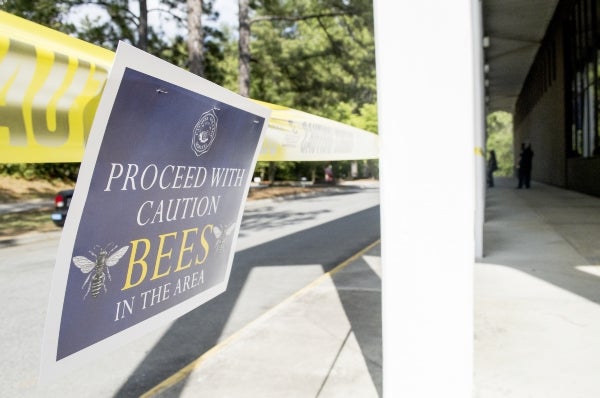Elizabeth Cook: Hidden blessings in bee problem
Published 12:00 am Sunday, May 24, 2015

- Caution tape and signs surround an area adjacent to Catawba College's Keppel Auditorium, where bees swarmed and caused the relocation of several events.
Who knew bees could cause so much trouble?
People at Catawba College noticed large swarms of bees in the trees outside the Robertson College-Community Center several weeks ago. Bees buzzed around a spot on the roof’s edge and appeared to be going in and out of a seam in the exterior wall.
Live bee traps placed on the roof were only marginally successful. The swarm looked menacing.
First Catawba had to move its May 16 commencement exercises from Keppel Auditorium to Omwake Dearborn Chapel on the campus, dividing the ceremony into two parts to accommodate the crowds.
Several days later, the Rowan-Salisbury School System announced high school graduations that have been held in Keppel for more than a decade would have to move back to the schools’ respective campuses.
The high school graduations are coming full circle. They moved to Keppel after the terrorist attacks of Sept. 11, 2001, for security reasons — a somewhat murky explanation. Now another hazard is pushing the ceremonies back to high school campuses.
You might be wondering why it’s taking Catawba so long to exterminate these critters, but that’s just it. The college does not want to kill the bees; Catawba is committed to saving them. College officials just want the bees to find off-campus housing — waaaay off campus.
Why save the bees? Perhaps you have not heard of the coming “Beepocalypse,” as one writer dubbed the problem. In contrast to Catawba’s overabundance of bees, the Beepocalypse is the dying-off of the country’s bee population, thanks to toxic pesticides, climate change, mites and mysteries yet to be solved. Whole colonies are dying, much to the dismay of beekeepers and farmers. If this keeps up, someday we may have to pollinate food crops by hand.
The N.C. General Assembly is weighing in on the issue with Senate Bill 225, “The Birds and the Bees Act,” which is mostly about promoting and protecting bees.
Catawba, home to the Center for the Environment, will not willingly contribute to the demise of the bees.
“The quick solution would have been to kill them all,” says Tonia Black-Gold, Catawba’s communications officer. “We just — we can’t.”
The college has worked with local beekeepers who collected and removed three swarms. Many, many more remain.
The bees are trying to get into an overcrowded hive wedged in the upper level of the building. An unknown quantity of honey is deep in the concrete block walls.
Come Tuesday, experts from a firm the college contracted, Animal Control Experts, will begin the two- to three-week job of setting the situation right.
Black-Gold describes the process:
“It involves installing custom honeybee excluders that will prevent the bees from returning to the hive once they depart. A beekeeper … will be on hand through the process to relocate the displaced bees to new hives.”
After the bees are removed, the company will seal the top of the Robertson Center and guarantee the bees will not return for two years.
“As a college, we are collectively committed to resolving this issue without harming the bees,” Black-Gold says.
The cost is the same — several thousands of dollars. The save-the-bees option takes about twice as long as extermination and removal.
As a result, the college has cancelled events that had been scheduled in the Robertson Center for a long time — several dance recitals, for example, and a patrons benefit dinner for Novant Health. Even Pops at the Post will have to come up with another Plan B, in case of rain.
The bees should graduate to greener pastures in time for Girls State and Boys State to convene at Catawba, college officials hope.
Black-Gold says the college could not fix the bee problem any way but the right way.
“We feel good about our solution and think our public will too — one small step for us humans, one giant leap for beekind.”
One giant leap for high school tradition, too. Most local high school students would rather have graduation at their own schools, anyway, as generations before them did.
We can call this turn of events the blessing of the bees — pretty sweet.
Elizabeth Cook is editor of the Salisbury Post.

